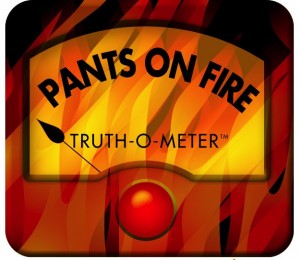 The Washington Post wrote an attack ad for Democrats that is divorced from reality.
The Washington Post wrote an attack ad for Democrats that is divorced from reality.
by Peter Roff
You have to hand it to the Washington Post’s Juliet Eilperin and Steve Mufson. In a recent piece that appeared online, the two intrepid reporters exposed the connection between brothers Charles and David Koch — whose legendary philanthropy supports a number of center-right organizations — the proposed Keystone Pipeline and the Republican Party.
The story would be worthy of a Pulitzer for investigative journalism except for one teeny, tiny little thing: It has so many errors in it, starting with its premise, that it wouldn’t be acceptable as a creative writing exercise in a freshman English class.
Working off a report compiled by a so-called activist group, Eilperin and Mufson reach the conclusion that a Koch Industries subsidiary is the largest leaseholder in Canada’s northern Alberta oil sands. Consequently the company – and the brothers – would derive a substantial economic benefit from the construction and operation of the Keystone Pipeline. All the agitation by Republican congressmen, senators and governors trying to get President Barack Obama to approve the pipeline is, therefore, little more than “crony capitalism” — an attempt to curry favor and garner future political contributions.
But as the excellent John Hinderaker has written over at the influential Powerline blog, none of these conclusions are true. The Koch’s subsidiary is involved in the oil sands, but is far from the largest leaseholder – even if its stake is substantially larger than that held by some of the “brand name” American oil companies. Furthermore, Koch Industries “will not be a user of the pipeline if it is built,” Hinderaker wrote, adding the pipeline’s construction “would actually be harmful to Koch’s economic interests, which is why Koch has never taken a position on the pipeline’s construction.”
Still, like the good left-liberals they are and acting in furtherance of a cause they apparently hold dear, Eilperin and Mufson decided not to let any actual facts get in the way of a good story, especially one like this that helps fill the campaign coffers of the Democratic Party and its candidates.
There’s no mistaking the connection. Whether it evolves from a formalized process akin to a game of “telephone” or folks can just sense what’s in the ether and take their marching orders from there, the open season on the Koch brothers that started before the Democrats lost control of the U.S. House of Representatives is not only continuing but escalating.
When it comes to the Kochs, the left is playing a giant game of connect the dots – except that the dots are un-numbered in a random pattern, so anyone can see what they want rather than what actually is or, more importantly, isn’t there.
Leading the charge is Senate Majority Leader Harry Reid, D-Nev., who perverts his constitutional immunity against lawsuits by going to the well of the chamber and saying almost any bizarre thing that comes to mind. He’s making personal punching bags out of the billionaire brothers, but not because he dislikes billionaires. We’re given to believe, for example, that he’s a big fan of Tom Steyer, a liberal billionaire who’s threated to run ads against any senators who support the Keystone Pipeline — but only if they’re Republicans — because building it will cost him dearly. No, Reid is doing what he does because it’s good for fundraising. “Bashing the Kochs,” David Weigel wrote Monday for the hardly center-right Slate, “can triple a Democrat’s fundraising haul.”
“I’ve seen some numbers from fundraising emails from one campaign that were sent from roughly mid-January to mid-March, pretty bad news cycles for the party. Nineteen emails didn’t mention the Kochs. They raised, in total, $48,146.30, for an average of $2,534.02 per message,” Weigel wrote. “But five emails mentioned, in at least some way, the Koch brothers. Those asks raised $32,668.72, an average of $6,533.74 per email. The Democratic base, which has been hearing about and fearing the Kochs for nearly four years, responds to this stuff” even if the rest of the country has little idea who they are.
It’s a pretty good return on investment, nevertheless. Rather than focus on the facts, Eilperin and Mufson crafted a tale that will serve well the interests of those who need inserts for direct mail pieces, talking points for fundraising phone calls and “scare quotes” for use in television ads. They’ve been called on it, but the damage is already done, and they’re not exactly backing down from the assertions they made in the story anyway. Apparently they have no shame.
. . . . . . . . . . . . . . . . . .
Peter Roff is a contributing editor at U.S. News & World Report. Formerly a senior political writer for United Press International, he’s now affiliated with Frontiers of Freedom. Follow him on Twitter @PeterRoff.